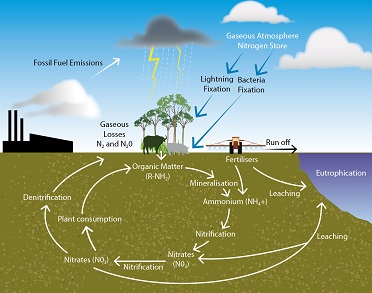Sneak Peek
This is a self Paced 20-hour course to help you understand more about and Learn to Better Manage Land, Landscapes and Soils
- Essential learning for farmers, landscapers, gardeners, property developers and managers, environmentalists
- CPD training for anyone working in land care
Understand how land quality can degrade or improve according to how we treat it.
Land is used by people for all sorts of things; from building cities to farming and mining. Any of these activities can however will change the land, sometimes for the better, but sometimes for the worse. Along with the activity of man, natural disasters such as floods, drought, cyclones and volcanic eruptions can cause damage to land.
This course teaches you about things that can be done to better care for the land, countering negative impacts such as these and improving long term viability, sustainability, health and productivity of a site.
Our 20 hour courses are self paced and will help you understand a topic in a short amount of time.
COURSE CONTENT- What do you learn?
This course covers the following lessons:
LESSON 1: SCOPE AND NATURE OF LAND MANAGEMENT
- Causes of Land Degradation
- Broad Principles of Sustainable Land Management
- Harnessing the People
- Careers in Land Management
LESSON 2: LAND DEGRADATION & REHABILITATION
- Forms of Land Degradation and Their Control
- Land Rehabilitation Management
- Mining Sites
- Environmental Assessment
- Land Management Programs
- The Importance of Trees on Farms
- Ecosystem Conservation
LESSON 3: MANAGING SOILS
- Soil Fertility
- Physical and Chemical Factors Affecting Nutrient Availability
- Biological Factors Affecting Soil Fertility
- Improved Nutrient Management
- Loss of Soil Fertility
- Understanding Soil Analysis
- Sampling Soil
- Strategies for Tackling Soil Degradation
- Conservation Tillage and Crop Residue Management
- Soil Biological Management
- Land Management Using Alternative Farming Techniques
- Using Organic Principles to Overcome Soil Problems
- Using Plants To Extract Contamination
LESSON 4: MANAGING WATER
- Water Erosion
- Water Reuse And Recycling
- Wastewater Treatment
LESSON 5: MANAGING PLANTS 
- Controlling Plants
- Using Plants For Erosion Control
- Planning Rehabilitation
- Plant Selection And Establishment
- Plant Varieties
- The Economics of Plant Selection
- Planting Preparation - Soil Cultivation
- Cultivation Machinery & Tools
- Planting Techniques
- Other Techniques
- Soil And Water
- Types of Water Wastage
- Irrigation Systems
- Coping With Dry Conditions
- Plant Protection Methods
- Weed Management
- Crop Rotations
LESSON 6: MANAGING ANIMAL POPULATIONS
- Creating Habitat Corridors For Wildlife
- Wildlife Conservation
LESSON 7: AFTERWARDS
- Plant Associations
- Natural Regeneration
THIS COURSE IS RELEVANT TO MANY DIFFERENT INDUSTRIES
Land care (or management) relates to sustainable management of urban regions, peri-urban regions, rural regions, coastal regions, forests, parks and wilderness areas; and can utilise many different actions, including:
- Protection of health of our natural environments.
- The sustainable use of soil and water.
- Maintaining or improving water quality.
- Improving the health of the soil and protecting it from erosion, salinity, acidity, disease and weed infestation.
- Protection and reintroduction of biodiversity – the flora and fauna (including soil life e.g. microorganisms and insects).
- Retention and protection of isolated stands of vegetation and soil ground cover.
- Fire management
- Increasing resilience to change - such as climatic variations.
When we manage lands we need to think about the wider consequences of all our actions because they contribute to the sustainability, resilience and well-being of the land. Prevention of problems is better economically, socially and environmentally, rather than trying to cure them.
Sustainable land management can only happen when people care and become involved. This includes land owners, politicians, professionals and the broader public. Educational programmes can help people understand problems associated with land use. Raising awareness can help achieve community support.
Continuous evaluation of land resources and research on the progress of soil degradation is required to develop suitable solutions. Programmes supporting the adoption of good land management practices by land owners and users need to be established. It may be necessary to set up legislation and policies to provide organisation and incentives and to ensure that all parties cooperate and adhere to principles.
CAREERS IN LAND MANAGEMENT

Careers in land management involve working with natural resources like soil, water, animals and plants. They are concerned with managing those resources effectively so that their health is maintained and biodiversity is conserved whilst enabling communities to use land productively.
Land management is an industry that will grow over the next several decades as populations continue to expand and we need to make better use of limited land resources. That said, those working in land management and related fields will probably need more than knowledge of the environment if they want to work in this sector for many years. An understanding of laws relating to land management, economics, and social implications is also of great benefit. Furthermore, awareness of social media avenues, computer software and technical aspects of land care are also skills which will stand potential employees in good stead.
Some types of environmental jobs can be dependent upon government funding and so the availability of those jobs will increase and decrease with changes in public funding amounts. Examples include jobs in environmental and land planning, policy and development. Other jobs however are available in more specialist niches, such as:
- Renewable energy
- Waste management
- Recycling
- Forestry management
- Tree planting
- Farm manager
- Soil scientist
- Salinity & acidity officers
- Agronomy or pasture advisor
- Vegetation management
- Wildlife management
- Parks management
- Environmental assessment
- Water management
- Fisheries
- Pollution & emissions
- Conservation
- Erosion control
- Green activities and eco-tourism
As with most career sectors, there are many different types of positions available such as assistant, technician, officer, supervisor, consultant and manager. These positions will demand varying amounts of responsibility so there are opportunities for people to gain entry into the industry and work their way up to higher positions. There are certificate and diploma courses in land management which will assist people to get employment. Degree courses may be required for higher level positions.
There is has been increased interest in land management and education concerning environmental issues at all levels as a response to growing awareness of stresses on our land. It is likely that new qualifications and courses of study as well as employment roles will be created over the coming years. The media have also taken a keen interest in land management issues and have done their part in getting issues out into the public domain. Land management as a career would appear to have a very bright future.
HOW MIGHT YOU BENEFIT FROM THIS COURSE?
- You will be more aware of what can go wrong with land that is not properly managed
- You will be able to see problems that are developing and formulate appropriate responses to curtail a problem before it becomes more serious
- You may broaden your employment possibilities, and decrease your need to call in and pay for the expertise of others
- You may improve the value of land you own or manage, and in due course increase profitability

FEATURES
- 20-hour, self-paced course
- Fully online
- Optional practical set tasks throughout
- Automated self assessment tests
- "Certificate of Completion" on achieving a 60% pass rate on a final assessment
-
How does this course work?
You can enrol at any time.
Once you have paid for the course, you will be able to start straight away.
Study when and where you like. Work through at your own pace.
You can download your study-guide to your smart phone, tablet or laptop to read offline.
There are automated self-assessment tests you can complete at the end of each lesson. You can attempt these as many times as you wish and each time, upon completion, you can see your results. You will need internet access to complete the self assessment tests.
At the end of the course, you are presented with a large assessment which can be attempted online, anywhere, anytime. If you achieve a 60% pass in the exam; you immediately receive a downloadable certificate of completion with your name on it. If you do not achieve a 60% pass rate, you can contact us to re-sit your exam. ( email- admin@acs.edu.au )
Contact us at anytime if you have any issues with the course. admin@acs.edu.au